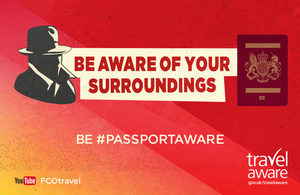Foreign & Commonwealth Office launches campaign to help British nationals keep their passports safe overseas
With over 21,000 British passports lost or stolen last year, the Foreign and Commonwealth Office (FCO) is urging British nationals abroad to be #PassportAware and keep their passport safe from thieves with the return of their Passport Hustle campaign
With summer now in full swing, many Britons are jetting off on their holidays. According to TripAdvisor, Europe is the hot destination. Majorca is number one for Britons, followed by Tenerife and Ibiza respectively, while Crete and Lanzarote come in fourth and fifth place.*
Most holidaymakers enjoy trouble-free trips. However valuable holiday time and money can be lost if a passport is lost or stolen as the victim may need to report the theft to the police, as well as spend time at the local Consulate or Embassy so that they can be issued with an emergency travel document (ETD). The cost of ETDs and new passports for two adults could pay for two additional nights in a mid-range hotel and two meals a day in Tenerife.** Consulates around the world issued over 30,000 ETDs last year, and assisted distressed British nationals who had been victims of crime.
To raise awareness of passport hustling techniques and to educate the public on how to avoid this crime, the FCO has produced a second series of short films with fraud and stealth crime expert James Freedman. These videos show a further four techniques that thieves use to steal passports as well as tips to avoid being a victim.
PlayRewindForward
Mute- Volume Down+ Volume Up100%
The timeline slider below uses WAI ARIA. Please use the documentation for your screen reader to find out more.
00:00:00
Tobias Ellwood MP, Foreign and Commonwealth Office Minister, said:
While we should all enjoy our holidays, it is important that we remain vigilant about valuables – particularly passports. Becoming a victim of theft or losing your passport could ruin your trip and replacing a passport will cost money and valuable holiday time.
By following the simple tips included in these videos you can minimise the risk of falling victim to thieves while abroad.
James Freedman, stealth crime expert, said:
With identity theft on the rise, the actual cost of losing your passport could be thousands of pounds. Criminals and con-men are always evolving the tricks they use to target tourists, but a few simple precautions will really help you to stay safe.
Only carry what you really need and keep cash and other valuables in a secure pocket or bag. Remember that if you put bags down, they should always be in your line of sight. If you don’t need your passport and other valuables when you’re out and about, leave them at the hotel. Above all, trust your instincts and be aware of anyone invading your personal space.
There are many other ways in which thieves can target your passports and valuables, and in addition to pickpockets, many Consulates worldwide have seen a rise in cases of items being taken from hire cars, such as the family of four who had their passports stolen from their hire car while they were touring the Alamo in San Antonio, Texas. Thieves anticipate items of value such as passports being left in hire cars, so don’t take any chances. Leave your passport in your hotel safe, or keep it with you and don’t give away its location.
The FCO’s top tips for keeping your passport safe:
be aware of your surroundings and be wary of strangers who take an unusual amount of interest in you
a damaged passport cannot be used for travel, so value it and keep it safe
lock your passport in a safe if you have access to one, or if you are required to keep it with you, ensure its location is not visible
make two photocopies of your passport – leave one with friends or family and take the second with you, or store an electronic copy securely. Where permitted, use your photocopy as alternative ID, for example when going out at night
for certain countries your passport must be valid for 6 months after the date you travel – check the entry requirements before you go
ensure you fill in the emergency details / next of kin page before you go
|
|
||||||
Check Todays Deals on Ebay.co.uk Your Comments:
Custom Search

|
You are in:
UK /
Alfreton / East Midlands
Find any Town in the UK, or Use UK map Local Google MAP for Alfreton Check Todays Deals On Amazon.co.uk Check Todays Deals on Ebay.co.uk 


 Be Seen - Advertise on Qlocal Corporate Sponsors
Southport Piano and Music Academy Washroom Services Maximum Grounds Maintenance Southport Garden Services Ormskirk Garden Services Sanitary Bins Nappy Bins & Waste Disposal Confidential Shredding Services Legionella Risk Testing London Washroom Services Croydon Washroom Services Hounslow Washroom Services Wandsworth Washroom Services Havering Washroom Services Sanitary Bins London Clinical Waste London General Waste London Legionella Testing London Shredding London Tatoo Waste London Preston Bird Control Blackpool Bird Control
UK, Local Online News Community, Forums, Chats, For Sale, Classified, Offers, Vouchers, Events, Motors Sale, Property For Sale Rent, Jobs, Hotels, Taxi, Restaurants, Pubs, Clubs, Pictures, Sports, Charities, Lost Found
alfreton,
alfreton News,
|
|||||





 Reply With Quote
Reply With Quote